- Home
- Alex Archer
Sunken Pyramid
Sunken Pyramid Read online
At the bottom of a lake lies an ancient cache worth killing for…
The note from her friend and colleague had read “I have quite the monster for you to chase, dear Annja.” And then before she could speak to him, he’d been found dead in the hotel’s stairwell. It didn’t seemed possible. Annja Creed had been looking forward to three days of geeking out at the archaeology conference in Madison, Wisconsin, and then this tragedy strikes. And his is only the first death over the long weekend.
Determined to investigate her friend’s death—and find out why another colleague she trusts is arrested as the prime suspect—Annja starts gathering the pieces of a cryptic puzzle. A small collection of Mayan gold medallions. The death of a potter. The violent appearance of a teenaged girl with a strange green knife. And at the center of the puzzle, an ancient mound pyramid purportedly hidden at the bottom of a Wisconsin lake. That’s a discovery that could completely rewrite Mesoamerican history.
With each puzzle piece Annja Creed discovers, the mystery grows more dangerous. And what she knows can—and probably will—kill her.
“What’s down there that got you and Dr. Papadopolous killed?”
Lost in thought, Annja stood and stared at the lake so long her legs ached from not moving. The moon came out from behind a cloud, reflecting against the tiny waves and making it look as if sequins had been scattered across the water’s surface.
This setting seemed wrongly tranquil and falsely placid, looking on one hand as if it could be on a postcard, and on the other as if it could appear in the next Stephen King movie.
“Come to Rock Lake,” Annja murmured. “Enjoy the scenery and watch your step.” In her mind she saw Edgar’s body broken and twisted at the bottom of the stairs. Movement along the shore caught her attention. It was someone with a flashlight, not tall enough to be Detective Rizzo. She couldn’t tell whether it was a man or a woman.
The beam of light swung toward Annja, picked her out and then the flashlight went dark. Annja peered into the shadows, trying to separate them and make out the figure in the mist. The prickling at the back of her neck told her this wasn’t a tourist….
Titles in this series:
Destiny
Solomon’s Jar
The Spider Stone
The Chosen
Forbidden City
The Lost Scrolls
God of Thunder
Secret of the Slaves
Warrior Spirit
Serpent’s Kiss
Provenance
The Soul Stealer
Gabriel’s Horn
The Golden Elephant
Swordsman’s Legacy
Polar Quest
Eternal Journey
Sacrifice
Seeker’s Curse
Footprints
Paradox
The Spirit Banner
Sacred Ground
The Bone Conjurer
Tribal Ways
The Dragon’s Mark
Phantom Prospect
Restless Soul
False Horizon
The Other Crowd
Tear of the Gods
The Oracle’s Message
Cradle of Solitude
Labyrinth
Fury’s Goddess
Magic Lantern
Library of Gold
The Matador’s Crown
City of Swords
The Third Caliph
Staff of Judea
The Vanishing Tribe
Clockwork Doomsday
Blood Cursed
Sunken Pyramid
Sunken Pyramid
Contents
Chapter 1
Chapter 2
Chapter 3
Chapter 4
Chapter 5
Chapter 6
Chapter 7
Chapter 8
Chapter 9
Chapter 10
Chapter 11
Chapter 12
Chapter 13
Chapter 14
Chapter 15
Chapter 16
Chapter 17
Chapter 18
Chapter 19
Chapter 20
Chapter 21
Chapter 22
Chapter 23
Chapter 24
Chapter 25
Chapter 26
Chapter 27
Chapter 28
Chapter 29
Chapter 30
Chapter 31
Chapter 32
Chapter 33
Chapter 34
Chapter 35
Chapter 36
Chapter 37
Chapter 1
“Nahkom, īaq enakah āēsīyan?”
Nahkom spun to face the craggy-faced youth who’d spoken. She knew Cha-kau-ka had been following her, showing himself now only because the trees had yielded to a stretch of barren ground and there was nothing left to hide in.
She wanted to be rid of him.
“Nahkom, īaq enakah āēsīyan?”
She wrapped her mantle tight when the wind gusted and stared defiantly at him. Nahkom was confident that she was as good a hunter as any man in her tribe, and she would serve her people best pursuing game, not tending to simple chores.
“Nahkom, īaq enakah āēsīyan?” He’d said it louder this time.
She answered, explaining that she intended to gain pelts for trading, and waved her stone ax for emphasis. Then she hurried south, where beyond this great clearing the pine forest thickened and rose to blot out the bright blue winter sky. She looked only once over her shoulder, seeing Cha-kau-ka shake his head in obvious dismay.
He would not follow her into the dense section of trees. The people from her village did not hunt there, in part out of respect for a band of Hochungra who lived in the area. But mostly they avoided it because the elders believed that the Anamaqkiu lived under the section of canopy where the light could not reach. The Anamaqkiu were the dark spirits of the underworld, and she recalled a tale from her childhood about them stealing the life breath from babies.
The Anamaqkiu had been very active lately, setting the ground to tremble fiercely. Days past, the quake was so strong it took down her father’s lodge. Today the earth was quiet, though, and the snow cushioned her feet and chilled the soles through her moccasins.
Nahkom had slipped away into these same woods at the end of Blueberry Moon and had not found any dark spirits—she’d found nothing but trees and trees, though admittedly she had not gone far. Tales, nothing more, she decided, and words would not keep her from hunting where surely game was plentiful and where Cha-kau-ka would not come. Young, he believed all the stories.
Now she decided to go much farther, and under the thick canopy she was not disappointed. Within minutes Nahkom was carefully skinning a large fox. As she worked, she listened to the branches shushing against each other in the breeze. She tipped her face up to take in the fragrant scent of the pine—preferable to the pong of blood from her kill. Seasons past she would have never hunted fox—only deer and only because her tribe ate them and used their hides. But the French had come, and they wanted fur. Dealing with the French was beneficial to her people, who had moved from their northern territories in pursuit of pelts for trade.
Finished, she admired the fur, so thick and soft. She rolled it, tied it with a cord and slung it over her back. The wind shifted, and in its whisper she heard birdsong. For several moments she did not move.
It was musical and wholly unfamiliar, and she wanted to see what bird made it.
She wove her way through the pine and birch trunks and followed a frozen stream. If she was lucky, she’d find a beaver mound and so would sate the French’s desire; they seemed to prefer the beaver pelts above all else.
When she caught a glimpse of feathers, her heart sank. Nothing more than a kākākēw, a common raven that was hiding behind a cluster of pinecones. But when it moved along the branch, she realized she was mistaken, and she had no name for this bird. It was singular.
The bright morning sunlight touched it, setting its feathers—that she had first thought black—to sparkle an iridescent, intense green and blue. It was as if the bird did not know precisely what color it wanted to be. It had a long tail plume that shimmered like stars reflected on night-dark water. Its head, neck and chest were the rich shade of wet ferns, and its lower belly and beneath the tail was bright crimson. There were violet streaks in its plumage, and when it turned, she saw that the outside tail feathers were snow-white.
She gasped at its startling beauty, spooking it. The bird lifted from the branch, its wings glittering with bits of silver, and glided away. Captivated, Nahkom dropped her pelt and followed. Then she lost track of it, finding something else to steal her attention—a broad, massive stone building on the edge of a lake. The water was not frozen, and it should have been. Perhaps it was new, just born, and so had not had the time to ice over. Maybe the dark spirits had called it up from the belly of the world with all the quaking the earth had been doing. Maybe the dark spirits wanted to drown the massive stone building, which had challenged the trees in height.
Had the French built the structure? The moment that notion came to her, she dismissed it. The French were intelligent, with their guns and fine, complicated clothes, their difficult language and all the trappings of their society...but they had not been in these lands long enough to build this.
Who lived here?
The Anamaqkiu? Their enemy? If the latter, no wonder the dark spirits were rocking the earth to get rid of it.
Nahkom padded forward.
The stone was worn, indicating its great age, but the years had not erased all the intricate carvings on the bricks. Her fingers traced images of creatures that were half beast, half men, and of the bird that had drawn her here. There were several depictions of the bird, the largest with its wings spread wide and head held up toward the sun.
There were sun carvings, too, and of people bowing down. And more of the bird, so very many of the bird. She heard it, still chirping melodically. Perhaps the beautiful creature had flown to the other side. Nahkom climbed up to a ledge that appeared to wrap around the entire structure. She followed the path, rewarded to find an entranceway on the opposite side and steps that led up to it...and amazed to find more buildings stretching toward the horizon, their bases cocooned by the frozen lake. Was all of this a city? And was the lake growing to swallow it?
There were no tracks but hers, no scents or sounds of people. No one had lived here in a very long time.
She glanced up at the opening. It was framed by an arch with numerous etchings of suns and birds. At the top, the stone head of a creature with small ears and long fangs protruded. A warning to stay out? A shiver flitted through her. Was this totem an image of a dark spirit?
She could still hear the bird. It had flown inside, and its song continued to tease her. Listening, she could hear more than one voice. More of the beautiful birds!
Nahkom pulled in a deep breath and followed the melody up the stairs and through the arch. The interior smelled moldy, reminding her of plantings that had been left too long in the ground and had started to rot. It was warm in here, the stone stopping the winter air from coming inside and holding on to the sun’s heat. She shed her deerskin mantle.
The sunlight stretched the length of a corridor filled with still more decorations on the stone. But these were painted, everything at the same time lovely and disturbing, the images fantastical and grotesque. Nahkom studied them slowly as she went, still listening to the birds.
Her course took her into a room filled with totems emerging from the walls, nests rested on the tops of those carved stone heads. She gulped in the turgid air and saw more than a dozen of the amazing birds perched. There appeared to be an equal number of males and females, the droppings thick on the floor. The sunlight did not reach quite far enough for her to see the entirety of this chamber, and so she relegated herself to only where the light touched the ground. A part of her worried that the Anamaqkiu—or something worse than the Anamaqkiu—might indeed be hiding in the thickest shadows, and that her chief’s stories might be true.
There were trinkets scattered everywhere—bowls, vessels, beads and tools, and she fell to examining them, all the while listening to the birds. The greatest singers of her tribe could not match the wondrous chorus. The birds must stay well here in the winter, she thought, the building protecting them from the brunt of the snow and cold that always came with Anāmaehkatwan-kēsoq, Shaking Hands Moon. Maybe the birds would share this place with her. She would bring seeds and pinecones in trade for their music and company.
Some of the bowls were as red as blood, and she shuddered to see that they were filled with finger bones. She pushed them against the wall and continued her exploration, moving aside rotting strips of fabric and discovering small skulls. If the Anamaqkiu stole the breath of babies, perhaps they also stole their heads.
But there was beauty amid the clutter of death. Jewelry the likes the French and the artisans of her village could not have fashioned. Intrigued, and fighting down a rising worry of the dark spirits, she probed farther, coming to the very end of the sunlight and seeing the laid-out form of someone who must have been important. Lengthening shadows kept her from all the details, but she could tell he was wrapped in what had once been beautiful cloth. An impressive headdress crowned him, and her questing fingers tugged it loose.
She nearly put it on, but it was heavy, and she did not want to tempt the spirits. Nahkom settled on removing a disk that was around his neck and prying a knife from his dead grip. His hands broke with her act of theft, and the cracking sound silenced the birds. There were tiny figurines around him, more of the half beasts. She decided not to disturb these, but only because she did not have any pouches to put them in.
She noticed the light had retreated behind her. She took a last look around then hurried out with the disk and the knife, stumbling down the corridor and scraping her face against the wall. She picked up her mantle and wrapped it around her. Outside, she saw that the sun was lower, the morning long gone and the day deep into its afternoon. Nahkom had lost track of time inside the building—her building. But the sun was still bright enough, and it set the disk in her hand to practically glowing. It was so shiny and smooth, and the image of one of those beautiful birds had been pressed into the center of it. The disk had a comfortable weight to it, and it was pleasantly warm against her palm.
There was a hole at the top, where a piece of rotted leather had held it to the dead man’s body. She took a strip of leather she’d brought for tying pelts, strung the disk and hung it around her neck. No doubt the French would offer her a great deal in trade for it. No! She shook her head and slipped the disk beneath the fold of her blouse. The French would want to know where she’d gotten it, and she did not intend to share the knowledge of her ancient building with anyone.
She stopped and examined the knife closely. The blade was long and curved, made of a sharp, pale stone, thin and impossibly hard. The edge of it was encrusted with something brown that flaked off as she worked at it. The handle was also some kind of stone, a mottled green like the hues of the forest melting together, and carved to look as if lizards had curled themselves around it. There was a strip of fur where the handle joined the blade, a piece of spotted, soft hide that had somehow defied the years. She wrapped her fingers around the handle and made a slashing motion. It would serve her better than the ax.
/> Nahkom retraced her steps around the ledge. The beautiful birds were singing again. She walked back into the woods and retrieved her dropped fox pelt. It would be wrong to abandon the fur. The creature had died to yield it to her, and the French might give her another blouse in trade for it.
When she reached the far edge of the woods and looked out on the stretch of barren ground, she spotted Cha-kau-ka. Had he waited all day for her?
He’d been busy, she realized as she drew closer. Next to him was a mound of hides he had collected, several of them beaver pelts. Her lone fox fur was pitiful in comparison. Certainly he would claim that he was the better hunter and that her rightful place was taking care of children.
“Nahkom, āq nakah wāēpīyan?” he asked.
She told Cha-kau-ka the truth, that she was coming from the darkest part of the forest where the Anamaqkiu and other spirits danced and sucked the breath from babies.
His mouth opened in a mix of surprise and disbelief. She pulled the necklace out from beneath the folds of her blouse as proof, and the rays of the setting sun caught the disk and made it look molten. Then she displayed the knife, which she’d tied to her belt. Cha-kau-ka reached toward it, and she obliged him.
A quick slash across his arm, another against his neck. The blade was sharp and sank into his flesh as if it was water; his draining life turned the snow crimson.
She’d wanted to be rid of him.
Nahkom added her pelt to his...a fine showing for a long day of hunting. Her father would be so proud of her. She tucked the disk back under her blouse, adjusted her mantle and headed toward her village, struggling under the weight of all the fur.
If anyone in the village asked about Cha-kau-ka...she’d tell them that she hadn’t seen her young brother. There were wolves in this area, and they would eat the evidence during the night.
She would return to her ancient building as soon as she traded all of these skins to acquire fine, complicated clothes from the French. Then in the chamber of finger bones and baby skulls she would listen to the song of the colorful long-tailed birds and search out more of the ancient treasures.

 Rogue Angel: Forbidden City
Rogue Angel: Forbidden City The Spider Stone
The Spider Stone Provenance
Provenance Blood Cursed
Blood Cursed Fury's Goddess
Fury's Goddess The Spirit Banner
The Spirit Banner Footprints
Footprints The Pretender's Gambit
The Pretender's Gambit Rogue Angel: The Lost Scrolls
Rogue Angel: The Lost Scrolls Staff of Judea
Staff of Judea Rogue Angel 55: Beneath Still Waters
Rogue Angel 55: Beneath Still Waters The Mortality Principle
The Mortality Principle Warrior Spirit
Warrior Spirit Paradox
Paradox Tear of the Gods
Tear of the Gods Forbidden City
Forbidden City River of Nightmares (Rogue Angel)
River of Nightmares (Rogue Angel) Rogue Angel: The Secret of the Slaves
Rogue Angel: The Secret of the Slaves Destiny
Destiny Rogue Angel 51: The Pretender's Gambit
Rogue Angel 51: The Pretender's Gambit Celtic Fire
Celtic Fire Rogue Angel 54: Day of Atonement
Rogue Angel 54: Day of Atonement Day of Atonement
Day of Atonement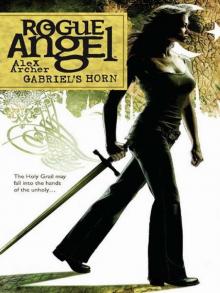 Rogue Angel: Gabriel's Horn
Rogue Angel: Gabriel's Horn Grendel's Curse
Grendel's Curse The Matador's Crown
The Matador's Crown Rogue Angel: The Chosen
Rogue Angel: The Chosen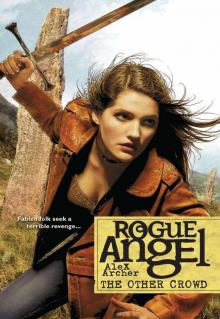 The Other Crowd
The Other Crowd Seeker’s Curse
Seeker’s Curse Rogue Angel 52: Death Mask
Rogue Angel 52: Death Mask The Golden Elephant
The Golden Elephant Blood Cursed (Rogue Angel)
Blood Cursed (Rogue Angel) Celtic Fire (Rogue Angel)
Celtic Fire (Rogue Angel)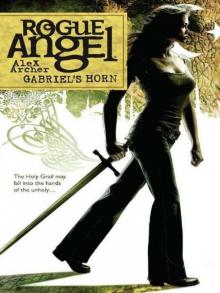 Gabriel's Horn
Gabriel's Horn Magic Lantern (Rogue Angel)
Magic Lantern (Rogue Angel) God of Thunder
God of Thunder Clockwork Doomsday
Clockwork Doomsday The Bone Conjurer
The Bone Conjurer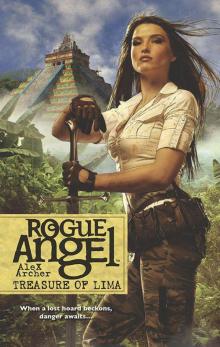 Treasure of Lima
Treasure of Lima The Soul Stealer
The Soul Stealer The Dragon’s Mark
The Dragon’s Mark Restless Soul
Restless Soul Rogue Angel: God Of Thunder
Rogue Angel: God Of Thunder Rogue Angel 49: The Devil's Chord
Rogue Angel 49: The Devil's Chord Death Mask
Death Mask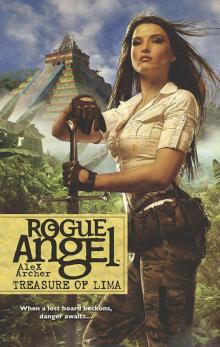 Rogue Angel 46: Treasure of Lima
Rogue Angel 46: Treasure of Lima Swordsman's Legacy
Swordsman's Legacy The Oracle's Message
The Oracle's Message The Third Caliph
The Third Caliph Tribal Ways
Tribal Ways Phantom Prospect
Phantom Prospect Rogue Angel 50: Celtic Fire
Rogue Angel 50: Celtic Fire Library of Gold
Library of Gold Rogue Angel 53: Bathed in Blood
Rogue Angel 53: Bathed in Blood Sacred Ground
Sacred Ground The Devil's Chord
The Devil's Chord Serpent's Kiss
Serpent's Kiss The Vanishing Tribe
The Vanishing Tribe Sunken Pyramid
Sunken Pyramid Sunken Pyramid (Rogue Angel)
Sunken Pyramid (Rogue Angel) City of Swords
City of Swords Bathed in Blood
Bathed in Blood The Lost Scrolls
The Lost Scrolls The Babel Codex
The Babel Codex Mystic Warrior
Mystic Warrior Eternal Journey
Eternal Journey Beneath Still Waters
Beneath Still Waters Solomon's Jar
Solomon's Jar Beneath Still Waters (Rogue Angel Book 55)
Beneath Still Waters (Rogue Angel Book 55) Cradle of Solitude
Cradle of Solitude Secret of the Slaves
Secret of the Slaves River of Nightmares
River of Nightmares Polar Quest
Polar Quest False Horizon
False Horizon